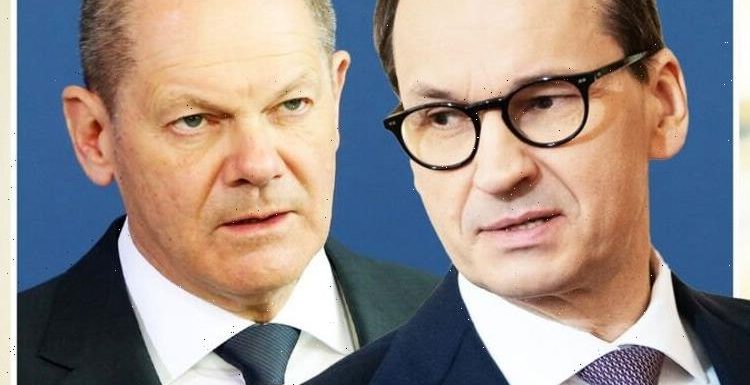
Germany 'getting ready for the worst case' over Russian gas
We use your sign-up to provide content in ways you’ve consented to and to improve our understanding of you. This may include adverts from us and 3rd parties based on our understanding. You can unsubscribe at any time. More info
Polish Prime Minister Mateusz Morawiecki said during a news conference on Monday that Berlin was causing a major roadblock to his country’s ability to punish Vladimir Putin for his invasion of Ukraine. Mr Morawiecki noted that even Hungary, which shares a border with Ukraine but has refused to send weapons, has not blocked sanctions. Morawiecki said: “We have to see that, regardless of how we approach Hungary, this is the fourth such win and we have to respect democratic elections … it’s Germany that is the main roadblock on sanctions.
“Hungary is for the sanctions.”
It comes after Prime Minister Viktor Orban, leader of the Fidesz party, won a fourth term in office in the national election on Sunday.
Mr Oban had previously come under for not taking a tough enough stance on Putin for his brutal attack on Ukraine.
Earlier this month, Mr Orban had said that the EU would not sanction oil and natural gas flows from Russia, and was not supportive of sanctioning Russian energy due to Hungary’s huge reliance on Russian imports.
But according to Mr Morawiecki, that has changed.


The Polish Prime Minister has instead called out Germany for its continued opposition to the tough sanctions being slapped down on Putin’s energy empire.
Germany, which gets 40 percent of its gas from Russia, has been arguing that it is still too reliant to ditch Russia’s fossil fuels.
Chancellor Olaf Scholz said last week that if Russia’s gas was cut overnight, ”entire branches of industry would have to stop working”, triggering a “considerable economic crisis”.
It was also not so supportive of the EU’s new energy strategy, REPowerEU.
The plan lays out how it would cope with plummeting Russian supplies after cutting Russian oil and gas imports by two thirds by the end of the year.

But Germany argued that its economy was too reliant on Russian supplies to follow through with these sanctions.
Meanwhile, Poland has demonstrated a far tougher stance in response to Russia’s aggression in Ukraine.
Mr Morawiecki last week unveiled what he called the “most radical” plan made by any country in an attempt to ditch Russian fossil fuels.
He said: “Today we present the most radical plan in Europe to move away from Russian hydrocarbons – Russian oil, Russian gas and Russian coal.
“When others in Europe looked at Russia as a business partner, we knew that Russia was primarily using gas as an instrument of blackmail.
DON’T MISS
Putin humiliated as Britain refuses Russia’s plan to boost economy [REPORT]
Lithuania humiliates Germany by standing up to Putin [REVEAL]
Germany to cut legs from under Russia with tough new sanctions [INSIGHT]

“That is why we have been persuading for years to take the tools of blackmail from Putin and Russia.”
Despite Poland’s anger at Germany, Berlin does appear finally appear to be stepping up and appears more willing to punish Russia with energy sanctions.
German Defence Minister Christine Lambrecht said during a TV interview on Sunday: “There has to be a reaction.
“Energy sanctions are among the things that will be discussed.”
And earlier that day, Mr Scholz said Germany is set to “adopt new measures during the coming days”.

But this only came after it was alleged that Russian troops had been committing horrific atrocities in Ukraine, reportedly exposed through photographs and eyewitness accounts.
German Vice-Chancellor Robert Habeck has also claimed that Germany can cut its imports of Russian oil in half by midsummer.
Mr Habeck added that the country could almost entirely put an end to the imports by end of the year, and claimed coal could be halved in “the coming weeks”.
But Poland never appeared as reluctant as Germany to take these decisions, despite also being somewhat dependent on Russia’s energy imports.
According to Forum Energii, a think tank, Warsaw gets 46 percent of its gas, 64 percent of its oil and 15 percent of its coal from Russia.
But Poland is still lagging behind Lithuania, Latvia and Estonia, which have rid themselves of Russian gas from April 1.
While Poland has argued that it will be able to scupper its energy ties with Putin, starting with banning Russian coal, Germany has appeared far more concerned.
In fact, after Putin threatened to cut the EU’s gas if “unfriendly” countries refused to pay in Russian rubles, Berlin erupted into a state of panic.
Mr Habeck’s stuck up an energy rationing plan to “increase precautionary measures to be prepared for an escalation on the part of Russia.”
He added: “With the declaration of the early warning level, a crisis team has convened.”
Source: Read Full Article